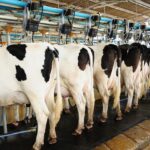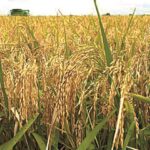Background
SAPZ is a five-year program designed by the Federal Ministry of Agriculture and Food Security (FMAFS) in close collaboration with the Africa Development Bank, (AfDB) the International Fund for Agricultural Development (IFAD), the Islamic Development Bank, States, as well as other key development partners.
The first phase of the SAPZ is being implemented in seven (7) states of Cross River, Imo, Kaduna, Kano, Kwara, Ogun, Oyo, and the Federal Capital Territory (FCT). Subsequently, more states would join in phase two.
The goal of SAPZ is to increase household incomes, foster job creation in rural agricultural communities, especially for youth and women, and enhance food and nutritional security in Nigeria. The development objective is to support inclusive and sustainable agro-industrial development in Nigeria.
SAPZ is aligned to the National Agricultural Technology and Innovation Policy (NATIP) 2021-2024 and the National Livestock Transformation Plan 2019-2028. It will support economic and social development programs of the Federal Government of Nigeria (FGN) and the Participating States, and the FCT. It will also contribute to rural infrastructure development, improved access to agricultural markets, increased farm productivity, the adoption of agricultural technology, climate smart agricultural production and processing practices, increased value addition and agro-processing, increased skills acquisition, and job creation, for all actors along the value chain, including the smallholder farmers, women, and youth.
The SAPZs are agro-based spatial development initiatives designed to concentrate agro-processing activities within areas of high production, processing, and marketing of selected commodities. Essential elements of SAPZs include the Agro-Industrial Hubs (AIHs), Agricultural Transformation Centers (ATCs), Aggregation Centers (ACs) in an agricultural production area.
1.1 Program Components
The Program is being implemented through four main components: –
Component 1: Infrastructure Development and Agro-Industrial Hubs (AIHs) Management: This Component aims to provide the enabling economic infrastructure (roads, water and sewage system, energy, and optic fibre, etc.) for the zones, ready for the private sector businesses to acquire plots and operate their specific processing facilities. The component entails the construction and/or upgrading of Agro-Industrial Hub infrastructure, including office buildings, training centers, general services layout (fencing, internal and access roads/parking, drainage, power supply, water, sewerage, effluent management, health-and-safety), specialized services (quarantine, quality control labs/certification centers, breeding centers), business support services (administrative, knowledge/ICT/ procurement/ employment centers), and activities to implement the Environmental and Social Management Plans (ESMP).
Component 2: Agricultural Productivity and Production.
This component seeks to boost the supply of raw materials in the production areas that are in proximity to the AIH being developed under Component 1. It will support farm level productivity enhancing infrastructure in the zones (including irrigation schemes rehabilitation, land development and water supply), the development of Agricultural Transformation Centers (ATCs) and Aggregation Centers (ACs). These ATCs and ACs will be part of the SAPZ Master Plans developed under Component 1 and strategically located within the farming communities around the AIH and would be used for the facilitation of farmers’ access to essential inputs such as quality seeds, agro-chemicals, farm mechanization/digitalization and primary handling facilities.
Farmers will be trained on good farming practices including climate smart agriculture, quality requirements, testing and conformity standards and food safety. Farmers would also be provided with access to agricultural inputs and financing through digital applications and also irrigation facilities would be put in place in specific areas.
Component 3: Policy & Institutional. This component will provide support for: a) improving enabling policy, legislation and regulations for Agro-Industrial Zones in Nigeria; b) enabling business environment (special regulatory regime) and legal systems to support private sector investment, including One-Stop Shops, digital infrastructure, customs offices, immigration support, land access, contracts and permits in the AIH; c) investment promotion, branding and marketing of the agro- industrial zones; and d) capacity building for staff of relevant public institutions), (e) technical assistance for the review and mainstreaming of IT based Business Registration & Licensing systems, standard operating procedures for the SAPZ initiative in Nigeria. Specific and targeted policies, laws, rules and regulations to address inefficiencies in agricultural value chains will be supported under this component.
Component 4: Program Coordination and Management: This component will ensure that the SAPZ is efficiently and effectively managed to achieve expected results. The component will support the establishment of a Special Delivery Team within FMARD and Participating State Implementing Units (PSIUs) at state-level and the FCT Implementation Unit (FCTIU). Other services to be supported include training of program officers, and necessary studies including the development of other SAPZ phases and financial/technical audits. Support will be provided to oversight structures to be established at the Federal and State levels.
As part of this effort, the SAPZ Program seeks to develop comprehensive and culturally appropriate BCC materials tailored to poor rural farmers, women’s groups, and youth at the grass root levels. These materials will promote and improve good nutrition practices, the benefits of positive attitudinal and lifestyle changes on nutrition, and the importance of dietary diversity.
- Objectives of the Knowledge Materials and Training on Behavior Change Communication (BCC) on Nutrition.
The Goal of preparing BCC on Nutrition Knowledge Materials and Training includes promoting healthier dietary practices and better nutritional outcomes by affecting attitudes, knowledge, and behaviors.
The main objectives in this regard include:
a. Raise Awareness: Inform individuals, families, and communities of the importance of proper nutrition and its impact on health and well-being.
b. Promote Positive Attitudes: To refute some of the misconceptions and cultural barriers to the practice of nutrition and promote supportive attitudes toward positive nutrition practices.
c. Encourage Behavior Change: To provide the necessary knowledge and practical skills to the target audience to initiate and maintain good nutritional behavior.
d. Build Capacity: To train health workers, educators, community leaders, and others to effectively deliver messages around nutrition and foster behavioral change.
e. Improve Communication Skills: To train communication methods for varying audiences so that messages are clear, persuasive, and culturally accepted.
f. Support Policy Implementation: Align training and materials to implementation of national and global nutrition policies-on the furtherance of public health activities.
g. Monitoring and Evaluation-To create mechanisms to measure impact of BCC intervention on dietary behavior and nutritional outcome.
h. Promote and encourage the incorporation of best practices, especially within households and rural communities in order to attain food and nutrition security.
Kindly download the attached document for more details please.






Recent Comments